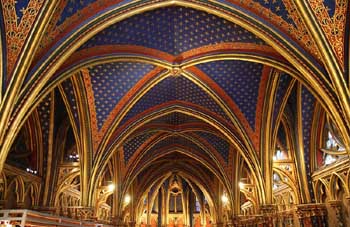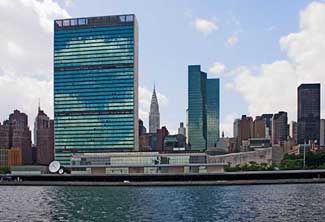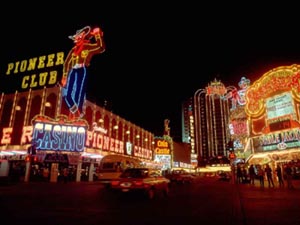 |
Organic Society
Organic versus Revolutionary Progress
Plinio Corrêa de Oliveira
After our discussion in the last article regarding the role of man in civilizing or defacing nature, we will now say a word about progress.
What is progress? What are the problems related to progress?
Let us begin by considering progress as it was understood more or less until the end of World War II. Then it was deemed an ascending movement of everything that had to do with man – and thus also with nature – toward what is better, more agreeable, more human – one might say, toward the paradisiacal.
It is almost inevitable that when man progresses he makes use of nature and makes it more beautiful in some ways. But he also spoils it and shatters many things even though this is not his primary intention.
So, this first notion of progress has to be adapted. Progress would not always be an improvement of the environment, but rather of everything that refers to man, inviting him to more fully develop himself and stimulating the improvement of mankind as a whole. Thus, even while it generates some negative aspects, the ensemble of human life receives a great advantage from it.
Let me stress that the progress I am speaking about here is not the revolutionary progress, the progress of the industrial revolution, for example. It is the result of the application of human skills to use nature for the service of man.
The ideal of a good paradise inspires the practice of virtues
When we talk about paradisiacal as a goal of progress, we have to consider that there are two concepts of what can be thought of as a paradise.

Saint Chapelle - an ambience that draws man toward higher horizons |
One is the good paradise that raises man out of his normal life, transferring him to a higher atmosphere and inviting him to practice all the virtues in order to attain Heaven. This kind of paradisiacal ambience already offers a foretaste of Heaven. Sainte-Chapelle in Paris is a splendid example of a building that does this. This paradisiacal note reflected in Sainte-Chapelle was conceived by medieval man as an ideal to be achieved by science and art. Filtering into all the spheres of human activity, it inspired an authentic Catholic progress. It aimed to help man in the practice of virtue and to transform society into a place to glorify God.
This does not mean that man always has to be living in a paradisiacal atmosphere. He normally lives in an ordered society that is calm, amiable and benevolent, without necessarily being sublime like Sainte-Chapelle. Nonetheless, that ideal which inspired Sainte-Chapelle – by a process of osmosis – would influence his day-to-day life.
We know that the arts in the Middle Ages – architecture, music, statuary, painting, sculpture, iron work, stain glass windows, book binding, etc. – reached an apex following this same path. This development happened not only in the arts that create an ambiance for man, but also in the arts that allow men to communicate - literature, rhetoric, dialectics, apologetics - and in those that stimulate learning - philosophy and theology - that achieved a degree of progress that in many ways has never been surpassed.
Just one example – compare the splendor of gothic architecture with today’s modern edifices. The Cathedral of Notre Dame in Paris attracts millions of tourists per year. How many travel to New York to admire the so-called crystal palace of the United Nations, a symbol of modern architecture? An incomparably fewer number. Gothic architecture continues to be greatly admired even in a revolutionary world like ours. This speaks loudly of the good progress that never fades.
A bad paradise for those who love sin
On the other hand, there are many men who live in mortal sin and choose not to follow the invitation to make good paradisiacal ambiences and art. Instead, they strive to build a fake paradise of delights replete only with human pleasures, with no thought of God. They flee the Cross of Christ as their worst enemy. The Renaissance abandoned the good medieval progress and turned back to the pagan pleasures of Antiquity that had been conquered by Christendom.

The UN headquarters - a utilitarian structure that lacks beauty |
For example, Catholic Morals had triumphed over the immoral tendency toward nudism; Renaissance art reestablished it. Catholic humility had tamed human vanity; the Renaissance was an explosion of pride. The Church had given man unity of thought and certainty in structuring his mind; the arrogant erudition and fatuous disputes of the Renaissance broke this unity, preaching that each person was entitled to his own opinion, even if it differed from the teaching of the Church. What followed soon after was the Lutheran free examination of Scriptures, which ended by dispersing that precious unity of the human spirit.
During this period the printing press was discovered by Guttenberg. In principle it was a good invention because it allowed men to communicate their ideas in an easier way. But in practice, this invention served to spread the Protestant ideas everywhere and thus helped to destroy the unity of Christendom. I know that this cannot be proved, but it seems as if the Guttenberg press was waiting in the wings for the Protestant rebellion to explode, and then it was introduced to help spread that revolution.
Something similar seems to have happened with the French Revolution. At about the same time it took power in France establishing a new State that endorsed liberty, equality and fraternity, a wave of new inventions emerged: the air balloon (Montgonflier), the steam engine for ships, trains and cars (Watt), the first battery to accumulate electricity allowing its use (Volta) and the effective use of it (Franklin). These are just some examples of inventions that would launch the Industrial Revolution, which established the foundation of modern progress.
Those inventions all came to light toward the end of the 18th century – as if they were either preparing or awaiting the French Revolution. And their development was used to fortify the new political-social views that this Revolution represented. I do not intend to demonstrate this as a thesis here. I am just saying that the concurrent appearance of all those inventions that served the Revolution can well be more than a coincidence, thus permitting a certain suspicion.
In any circumstance, the modern inventions marched forward pari passu with the advance of the Revolution. This is why in their various phases they are called revolutions – the Industrial Revolution, the Electrical Revolution, the Electronic or Cybernetic Revolution, and the coming Photonic Revolution – with each revolution making a more sophisticated and agile use of energy. Each of these revolutions broke with the previous status quo – razing what had been established before – hence the name ‘revolution.” And principally each one helped to destroy the organic progress that we praised above.


Las Vegas, the 'Sin City,' is the paradise of modern progress
|
As a rule modern progress does not look toward God or strive to help man practice virtue and save his soul. On the contrary, it is directed toward creating a technological paradise were everything that reminds one of original sin - suffering and death - must be suppressed. If we consider Las Vegas, we see that it was conceived to be the paradise of modern progress. It offers the possibility of making easy money by gambling, a transient extravagant comfort, delights for the sight, taste and smell followed by every possible kind of immorality at one’s fingertips. Las Vegas is in many ways the bizarre opposite of Sainte Chapelle; it is the paradise of modern progress.
Modern progress has also an agenda it promotes. It favors everything that is revolutionary - equality of social classes, equality of parents and children, of men and women, of employer and employee. It aims to destroy stability, authority, hierarchy, discipline and morality in society.
So far, I have described the bad sides of modern progress. We cannot deny that in some ways it brought good results, such as inventions that helped to cure diseases or greatly improve hygiene in the family home. Still other discoveries provided easier ways to work the land, cut wood, conserve food and multiply its benefits, etc.
It is my opinion that modern progress in itself is not necessarily bad. It has some good elements, but it is a good that was generally used for bad purposes. Thus it happened that modern progress became glued to the Revolution - or vice versa. The consequence is that the two became more or less interchangeable: the Revolution promoted modern progress to foster its ideals, and modern progress almost always favors the Revolution.
In summary, modern progress can be considered as a great good that was used to destroy things that were more valuable than the benefits this progress brought with it.
I believe that human creativity could have been directed in a different way if the general orientation of society had been turned toward the glory of God. But, for this to be corrected, we have to wait for the Reign of Mary.
One of the main errors of modern progress that permitted it to be manipulated by the Revolution was replacing the quest for beauty with the quest for the useful. This error should be avoided. In its first stage, the practical eliminated the beautiful. In its second stage, it was replaced by the ugly, and then by the horrendous. We see that gradually the horrendous is conquering all realms of society under the pretext of being more practical.
Very often what is veiled under this passion of modern progress is an eagerness to destroy the old customs that ordered Christendom, the law of Christ for nations. This passion for progress will only come to an end when the taste for virtue returns to society. What is needed is a new taste for a new kind of virtue - a universal counter-revolutionary virtue - which Our Lady is planting in some souls to prepare the advent of her Reign.

Posted May 27, 2009

  | | Prof. Plinio |
Organic Society was a theme dear to the late Prof. Plinio Corrêa de Oliveira. He addressed this topic on countless occasions during his life - at times in lectures for the formation of his disciples, at times in meetings with friends who gathered to study the social aspects and history of Christendom, at times just in passing.
Atila S. Guimarães selected excerpts of these lectures and conversations from the trancripts of tapes and his own personal notes. He translated and adapted them into articles for the TIA website. In these texts fidelity to the original ideas and words is kept as much as possible.

Related Topics of Interest
 How Man Should Act over His Natural Environment How Man Should Act over His Natural Environment
 Tradition, Stagnation and Progress Tradition, Stagnation and Progress
 The Medievals Were Barbarians... The Medievals Were Barbarians...
 The Natural and Unnatural Decline of the Clan The Natural and Unnatural Decline of the Clan
 Organic Society and a Desire for Heaven Organic Society and a Desire for Heaven
 The True Friends of the People Are Traditionalists The True Friends of the People Are Traditionalists
 The Immaculate Character of the Catholic Church The Immaculate Character of the Catholic Church
 Revolution and Counter-Revolution - Overview Revolution and Counter-Revolution - Overview

Related Works of Interest
|
|
Organic Society | Social-Political | Home | Books | CDs | Search | Contact Us | Donate

© 2002-
Tradition in Action, Inc. All Rights Reserved
|
 |
|